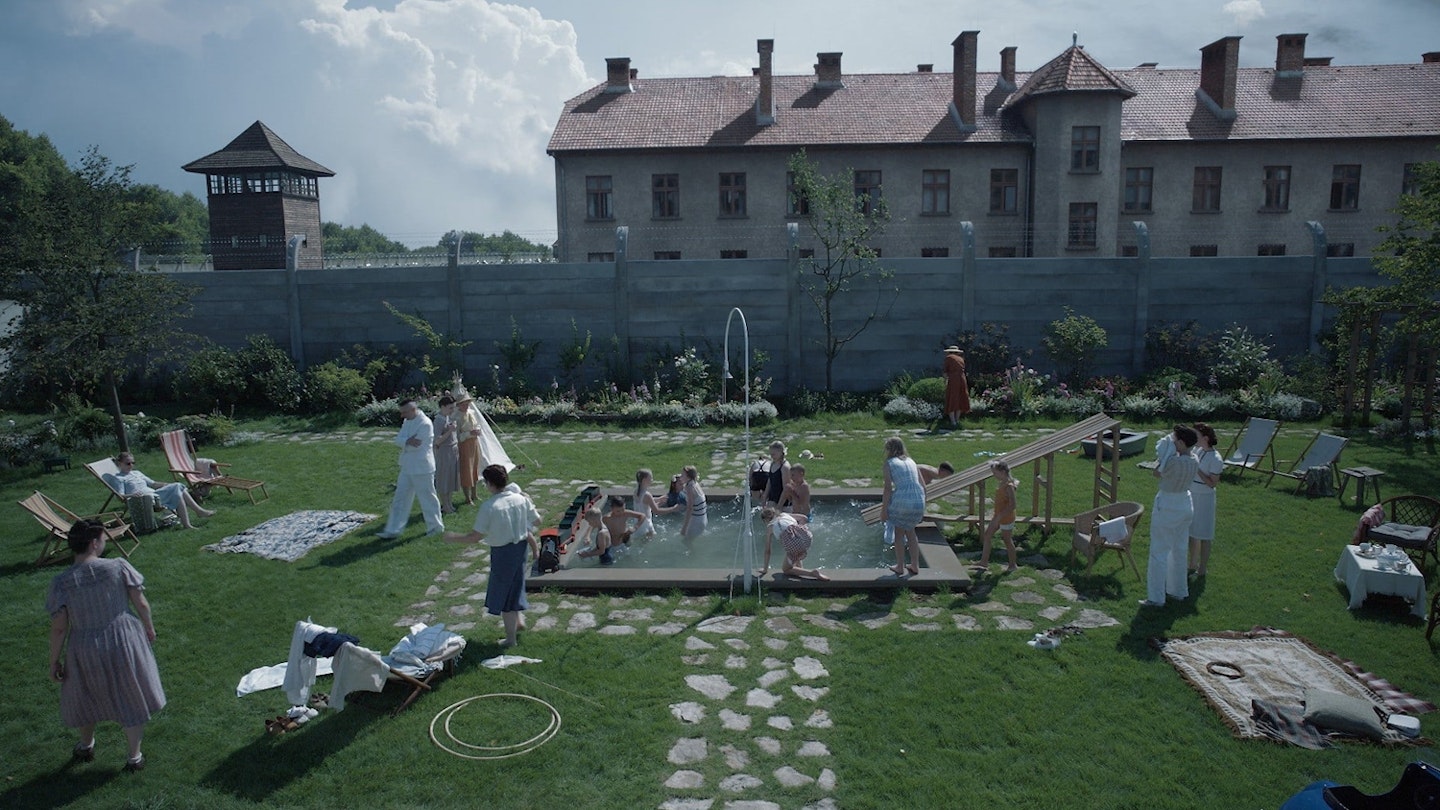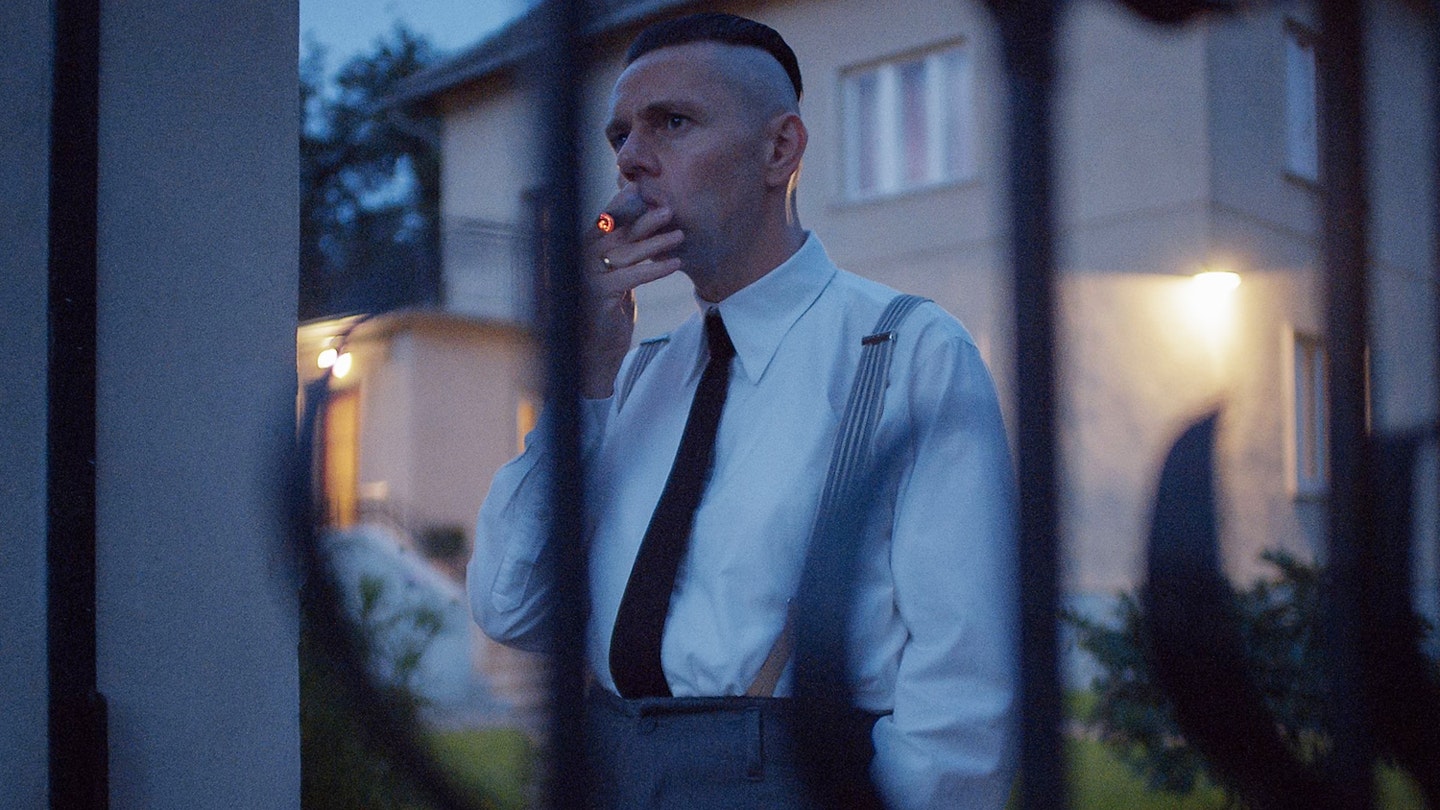Clothes and trinkets from Jews, facing degradation and starvation, if not death, find their way to Rudolf Höss’ house. His wife Hedwig (Sandra Hüller) tries on the spoils like she’s in Saks Fifth Avenue, slipping into a fur coat, twirling and posing in front of her bedroom mirror. Downstairs, Rudolf (Christian Friedel) conducts a work meeting, in which gas-chamber blueprints are pored over like designs for a new car, human incineration discussed in bland business tones. But what a magnificent house! Modernist by any era’s standards, it is beloved by the happy Höss family, despite the fact that it backs onto Auschwitz, literally — atop the garden wall is barbed wire, for it is also one of the camp’s walls (as it was in reality). A hulking watchtower is visible beyond it. A deathly chimney overlooks the Höss children’s paddling pool.

The family enjoy an idyllic life, swimming in a nearby lake, sunbathing in the long grass. In their bedroom at night, Hedwig and Rudolf natter and joke before sleep; otherwise, all is quiet. All except for the ever-present rumbling of the camp. The sound of whirring machinery. Grim bass hues that make you feel physically sick. In the daytime, inside the house, and outside in the splendid garden, the noise from over the wall is even worse. Orders are barked. Pain is heard. At one point, beautiful close-up shots of the garden’s lilacs and sunflowers are soundtracked by screams. But nobody who lives in this house cares. They’ve tuned all of that out, so meaningless is it to them. The frequent gunshots are not just ignored, they’re barely even registered.
So much more upsetting than can be described.
Jonathan Glazer’s unique film, which is so much more upsetting than can be described, is a study of what it’s like to have no moral conscience. By layering on all that sound as the Höss family get on with their days, with indifference to the incessant audible murder as they work and eat and laugh and bicker, Glazer humanises dehumanisation. Hedwig — in a superbly callous performance by Hüller — cares only about the house. Later, her mother comes to stay, and is given a tour of the garden by her proud daughter. There is some brief discussion of who’s on the other side of the wall. Could the Jewish woman Hedwig’s mother used to work for be there now? Probably. But it’s a quick conversation, swiftly forgotten as talk turns to cabbage, kale and pumpkins while they parade around the foliage, the camp looming over them. “Honestly,” says Mum, agog at the domestic paradise, “to have all this. You really have landed on your feet, my child.”
Save for one stark, low-angle look at Rudolf surveying Auschwitz, we don’t go into the camp at all. The point, and the power, is the everyday dismissal of what’s there. Glazer is steadfastly resistant to anything that might sensationalise the suffering. But we feel it, constantly. There’s an incredible shot of Hedwig’s mother in the middle of the night, peering through the bedroom window at the camp chimney fire that’s faintly reflected on the glass. It’s maybe a one-second shot, subtle and simple, and all the more startling because of it. Glazer doesn’t labour on it. Other than a couple of aesthetic departures in service of mood and poignancy, he doesn’t draw attention to himself, not permitting the filmmaking to get in the way (much of it was shot with hidden, or at least unobtrusive cameras, and directed remotely). Yes, The Zone Of Interest is about atrocity, but more importantly it is about the attitude towards it. Stylistically, there is a detachment, to match that of the perpetrators. And that’s what gets into your bones.
This is Glazer’s fourth film, following Sexy Beast, Birth and Under The Skin. He is an observer of the absurd, increasingly so, every time his approach more acute, and every time creating more distance. With each film he has become more refined and more restrained, to extraordinarily queasy effect here, not least because of an evil score by Mica Levi. The warped choral tones and unsettling drones are used economically. The end credits are accompanied by the sound of hell, a writhing, tortured sonic swamp. We’re left with that. It may never leave us.

